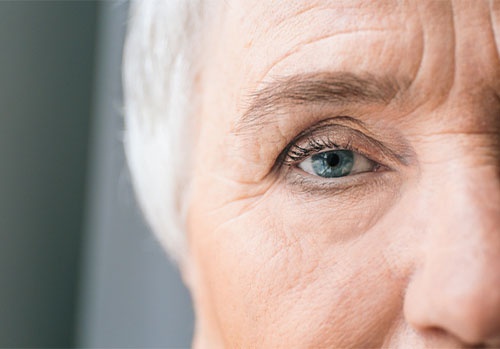
Image by Pixel-Shot
Aging Eye Health
We all know it’s normal to see changes in your vision as you age. In fact, it happens to be more common in those 40 years of age and older. Many may start having problems seeing clearly up close, while others have problems viewing things from far away. These changes are normal with aging eyes and may continue to progress over time. While eye problems and diseases become more prevalent with age, they can also be prevented or corrected with proper eye care. Below are a few tips for protecting your aging eyes.
Preventative Measures
- Visit your family physician regularly to check for medical conditions that may be the cause of eye problems, like diabetes, high blood pressure, or liver disease.
- Make appointments to see your ophthalmologist or optometrist annually for a complete eye examination to detect vision changes and eye diseases.
- Make note of your family eye history, eye diseases, and or eye conditions. Many eye problems can be hereditary and are important in determining if you may be at risk.
- Protect your eyes from sunlight by wearing sunglasses that block ultraviolet (UV) radiation and a hat with a wide brim when you are outside. All eyes need to be protected, but factors such as age or eye color may make certain groups more susceptible to eye damage or diseases that come from excessive UV exposure.
- Quit your smoking habit. Smoking is not only terrible for your lungs and body but your eyes as well. Smoking correlates with an increased risk of developing cataracts, optic nerve damage, or age-related macular degeneration, all of which may lead to intense vision loss or even blindness.
- Make smart food choices. You have heard that carrots are good for your eyes; however, eating a diet rich in fruits and vegetables― particularly dark leafy greens, like spinach, kale, or collard greens― is vital for maintaining healthy eyes, too! Protein like halibut, tuna, and salmon have also been shown to provide eye health benefits.
- Be physically active and maintain a healthy weight. Being overweight or obese may increase your risk of developing diabetes or other conditions that may lead to vision loss, like glaucoma, or diabetic eye disease. Talk to your doctor about how to maintain a healthy weight to promote eye health.
- If you spend a lot of time at the computer or focusing on one thing, take a break every 20 minutes to look about 20 feet away for 20 seconds to prevent eye strain. 20:20:20!
Eye Disease Warning Signs
Luckily, eye conditions and diseases progress at a fairly gradual rate. Warning signs of aging eye health problems may be fluctuating vision, seeing floaters and flashes, loss of peripheral vision, and seeing images that are distorted. Certain eye problems can lead to vision loss or blindness in older adults. As the eyes age, the risk for problems like age-related macular degeneration (AMD), diabetic retinopathy, cataracts, glaucoma, or dry eye may increase.
If you experience any vision warning signs, seek immediate medical attention from your eye doctor or ophthalmologist to schedule an eye exam. It is best to get your aging eyes checked earlier rather than later, as there may be treatments available to delay progression.
Got Medicare Questions?
We hope that this information on aging eyes is useful to you.
Let us help you answer your questions so that you can get back to the activities that you enjoy the most.
Call (888) 446-9157, click here to get an INSTANT QUOTE, or leave a comment below!
See our other websites:

